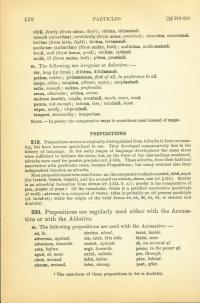219. Prepositions were not originally distinguished from adverbs in form or meaning, but have become specialized in use. They developed comparatively late in the history of language. In the early stages of language development the cases alone were sufficient to indicate the sense, but, as the force of the case endings weakened, adverbs were used for greater precision (cf. § 338). These adverbs, from their habitual association with particular cases, became prepositions; but, many also retained their independent function as adverbs.
Most prepositions are true case forms, such as the comparative ablatives extrā, īnfrā, suprā (for †exterā, †īnferā, †superā), and the accusatives circum, cōram, cum (cf. § 215). Circiter is an adverbial formation from circum (cf. § 214.b, Note); praeter is the comparative of prae, propter of prope.1 Of the remainder, versus is a petrified nominative (participle of vertō); adversus is a compound of versus; trāns is probably an old present participle (cf. in-trā-re); while the origin of the brief forms ab, ad, dē, ex, ob, is obscure and doubtful.

